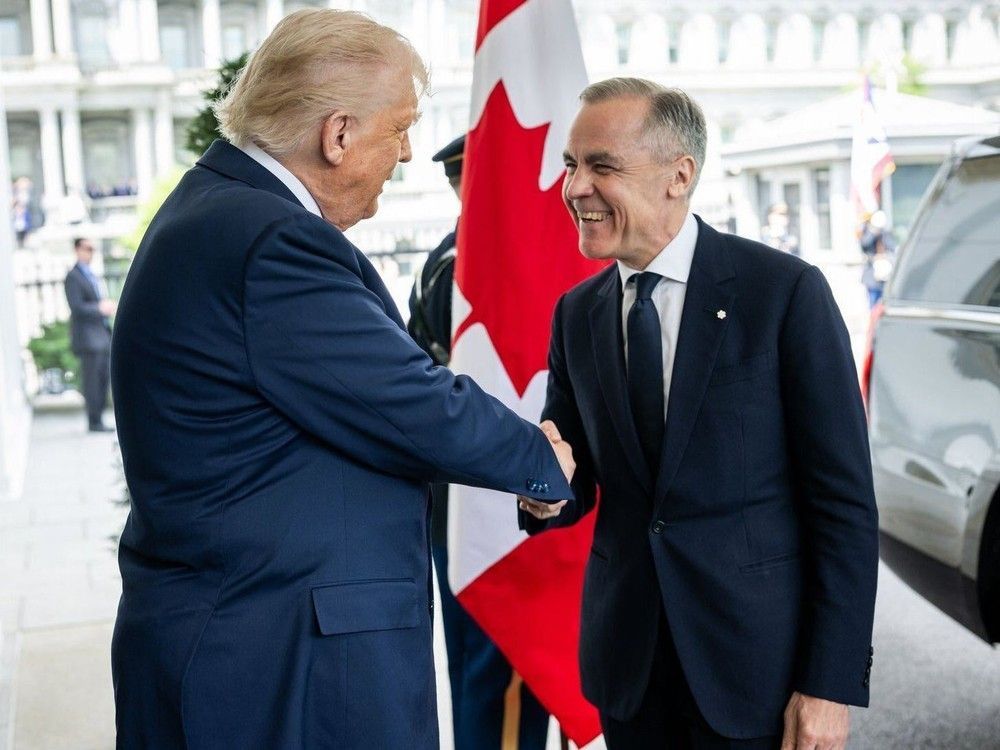
Frank McKenna says Mark Carney has “put to bed” Trump’s 51st state talk.
And in doing so, the former New Brunswick premier and Canada’s former ambassador to the United States says it will hopefully now allow Canada and the United States to find some level of certainty and stability in the days ahead.
“I viewed the whole thing positively,” McKenna said in an interview with Brunswick News analyzing the high stakes meeting at the White House. “Clearly, Trump was very respectful to our prime minister. Clearly, he respects our prime minister and likes him and that is really important.
“And the gating issue about Canada becoming part of the United States, our prime minister just put that to bed, flat out.
“There can be no question about that.”
That leads to what’s next.
“Now, we can get down to debunking the facts that Trump is using and get the real facts on the table and talking about the mutual benefits of working together,” McKenna said.
“I think that’s what was being done in the room with sleeves rolled up and hopefully out of that will come a process to allow us to get back on track.”
The Oval Office meeting was marked by Carney’s emphatic words that Canada won’t be for sale, ever.
They were met by Trump adding in “never say never,” although acknowledging that “it takes two to tango” and that it wouldn’t be a topic of further discussion, if no one else wanted to bring it up.
Later in the day, while holding a press conference in Washington at the Canadian embassy, Carney said he asked Trump directly behind closed doors to stop calling Canada the 51st state.
He elaborated more in his French response, saying he told Trump that it’s “not useful” to repeat the idea.
But Carney added that Trump is the president and that he’ll say what he wants to say.
Speaking later in the day to reporters, Trump was asked why he doesn’t call Carney “governor,” a title he had used with Justin Trudeau.
“As far as calling him Governor Carney, no I haven’t done that yet and maybe I won’t. I did have a lot of fun with Trudeau,” he said. “But I think this is a big step up. It’s a good step up for Canada.”
Trump said he watched Carney in the Canadian election debates and thought he did “terrifically.”
“I like him. He’s a nice man. We get along very well. We had a great meeting today,” the president added. “I think the relationship’s going to be very strong.”
McKenna said that should be seen as a very positive result of a first meeting.
“Both the principal actors were true to form,” McKenna said. “Trump was bombastic, meandering, boastful, he was what we’ve come to see.
“And Prime Minister Carney was what we see in Prime Minister Carney, respectful, diplomatic, he was firm, and he was able to, I think, stand strongly against what Trump was saying without being disrespectful, and that was a very tough balancing act.
“I thought he played it perfectly.”
Still, there were times where Trump was delivering outright lies, McKenna said, and Carney didn’t interject.
Trump falsely claimed repeatedly that the U.S. “subsidizes” Canada, the former premier admitting that it had him yelling at his own television as it happened.
“Everybody else in Canada felt anger and betrayal, but I think Carney was very conscious of the fact that he was in the Oval Office, that he was being hosted by the president of the United States, and the potential for things to go sideways in a hurry were very high,” McKenna said, recalling Ukraine President Volodymyr Zelenskyy’s “horror show” visit that spiralled into a confrontation.
“So I think the prime minister was smart to hold his cards back until they got into a private setting.”
The path forward is finding a way behind closed doors to underscore the facts.
McKenna also said he wasn’t discouraged when Trump, sitting beside Carney, said that there was no way for Canada to see existing U.S. tariffs on Canadian goods removed.
“That’s contradictory to the evidence,” McKenna said, noting reciprocal tariffs placed on countries around the world were pulled back dramatically, while exemptions to tariffs on China were made for smartphones, computers and some other electronic devices.
He also pointed to how the so-called fentanyl tariffs on Canada and Mexico are zero for goods that are compliant with the existing free trade deal, while Trump also introduced exemptions to auto tariffs.
“In fact, he has said very bold assertive things, but then every time there’s a pain point he pulls back and flip flops,” McKenna said. “I don’t put any stock in those words.”
The former premier and ambassador said the goal should now be to get away from the “violent, off-the-cuff” decision making of the U.S. president and into a process where professional negotiators work out the details of a next arrangement.
That’s while McKenna openly questioned how Canada and the world can get back to a place where agreements with the U.S. are abided by and followed.
“How do we trust our partner?” he said.
“The United States has got a lot of work to do to convince any of its partners around the world that it can be trusted.”
For now, at least, a first step has been taken.
“I think the highlight reel for decades to come in Canada will be our prime minister standing up and saying ‘Canada is not for sale,’” McKenna said.